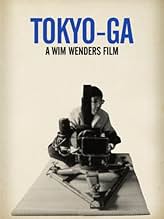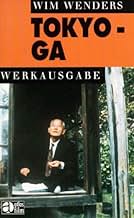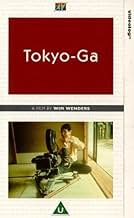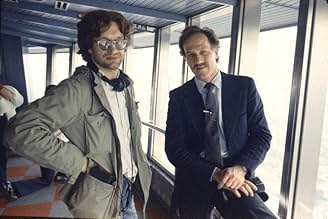Tokyo-Ga
- 1985
- 1h 32m
IMDb RATING
7.3/10
3.6K
YOUR RATING
Moved by the work of director Yasujirô Ozu, Wim Wenders travels to Japan in search of the Tokyo seen in Ozu's films.Moved by the work of director Yasujirô Ozu, Wim Wenders travels to Japan in search of the Tokyo seen in Ozu's films.Moved by the work of director Yasujirô Ozu, Wim Wenders travels to Japan in search of the Tokyo seen in Ozu's films.
- Director
- Writer
- All cast & crew
- Production, box office & more at IMDbPro
Storyline
Did you know
- Quotes
Wim Wenders: It felt good just to look out the window. If only it were possible to film like that, I thought to myself, like when you open your eyes sometimes just to look without wanting to prove anything.
- ConnectionsFeatured in De zee die denkt (2000)
Featured review
Wim Wenders attempts to turn his first trip to Japan into a homage to Ozu and an exploration of Japanese modernity, contrasted with the images of a bygone era glimpsed in Tokyo Monogatari.
This is a deeply personal film, an unabashed pilgrimage by Wenders in search of his muse. His rambling narration, impenetrable at times, offers little insight on Japan. What first-time visitor can encapsulate a city as complex as Tokyo? The film works better on the subject of Ozu, the interviews with actor Chishu Ryu and cinematographer Yuuharu Atsuta offering glimpses of Ozu the man behind the icon. They also reveal the affecting power of cinema, both men clearly humbled and moved by the experience of collaborating with Ozu. The bottom line, however, is that this is a film about Wim Wenders, about his nascent stage as a filmmaker and how that came to fruition in the way it did. Fans of Wenders, rather than Ozu or Japanophiles, are the audience for this film.
Technically the film offers up a few gifts, the prime example being a glimpse of the craftsmanship that goes into the making of the ubiquitous wax food in restaurant display windows. Unlike the weekend rockabilly dancers, crowded commuter trains, or oppressive concrete and steel structures, this sequence brings something both long-term residents and those ignorant of Japan will find fresh and illuminating. Unfortunately, elsewhere the film is interspersed with interminable footage of being in a taxi, being in a train, men hitting golf balls... all protracted shots for no other reason than to add a touch of Ozu to the film. A funky, slightly disturbing score helps make these sequences bearable.
Tokyo-Ga is recommended for Wenders fans, and perhaps as nostalgia for anyone who spent a brief time in Japan in the mid-Eighties.
This is a deeply personal film, an unabashed pilgrimage by Wenders in search of his muse. His rambling narration, impenetrable at times, offers little insight on Japan. What first-time visitor can encapsulate a city as complex as Tokyo? The film works better on the subject of Ozu, the interviews with actor Chishu Ryu and cinematographer Yuuharu Atsuta offering glimpses of Ozu the man behind the icon. They also reveal the affecting power of cinema, both men clearly humbled and moved by the experience of collaborating with Ozu. The bottom line, however, is that this is a film about Wim Wenders, about his nascent stage as a filmmaker and how that came to fruition in the way it did. Fans of Wenders, rather than Ozu or Japanophiles, are the audience for this film.
Technically the film offers up a few gifts, the prime example being a glimpse of the craftsmanship that goes into the making of the ubiquitous wax food in restaurant display windows. Unlike the weekend rockabilly dancers, crowded commuter trains, or oppressive concrete and steel structures, this sequence brings something both long-term residents and those ignorant of Japan will find fresh and illuminating. Unfortunately, elsewhere the film is interspersed with interminable footage of being in a taxi, being in a train, men hitting golf balls... all protracted shots for no other reason than to add a touch of Ozu to the film. A funky, slightly disturbing score helps make these sequences bearable.
Tokyo-Ga is recommended for Wenders fans, and perhaps as nostalgia for anyone who spent a brief time in Japan in the mid-Eighties.
- LunarPoise
- May 31, 2008
- Permalink
- How long is Tokyo-Ga?Powered by Alexa
Details
Contribute to this page
Suggest an edit or add missing content
























